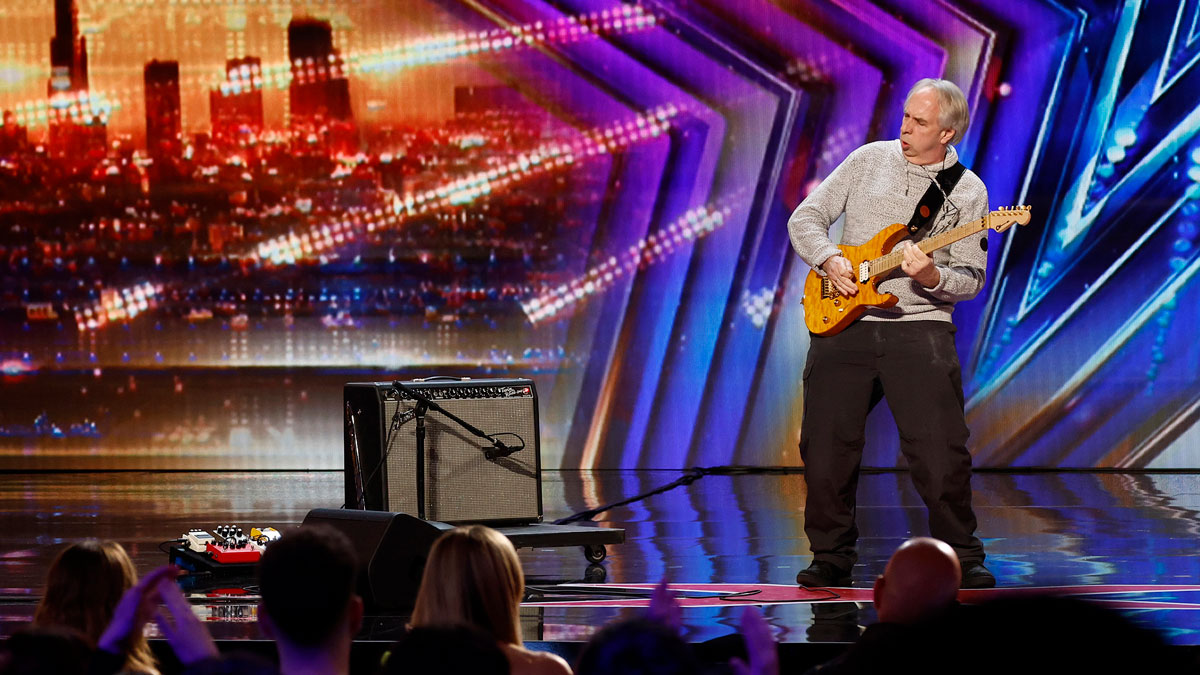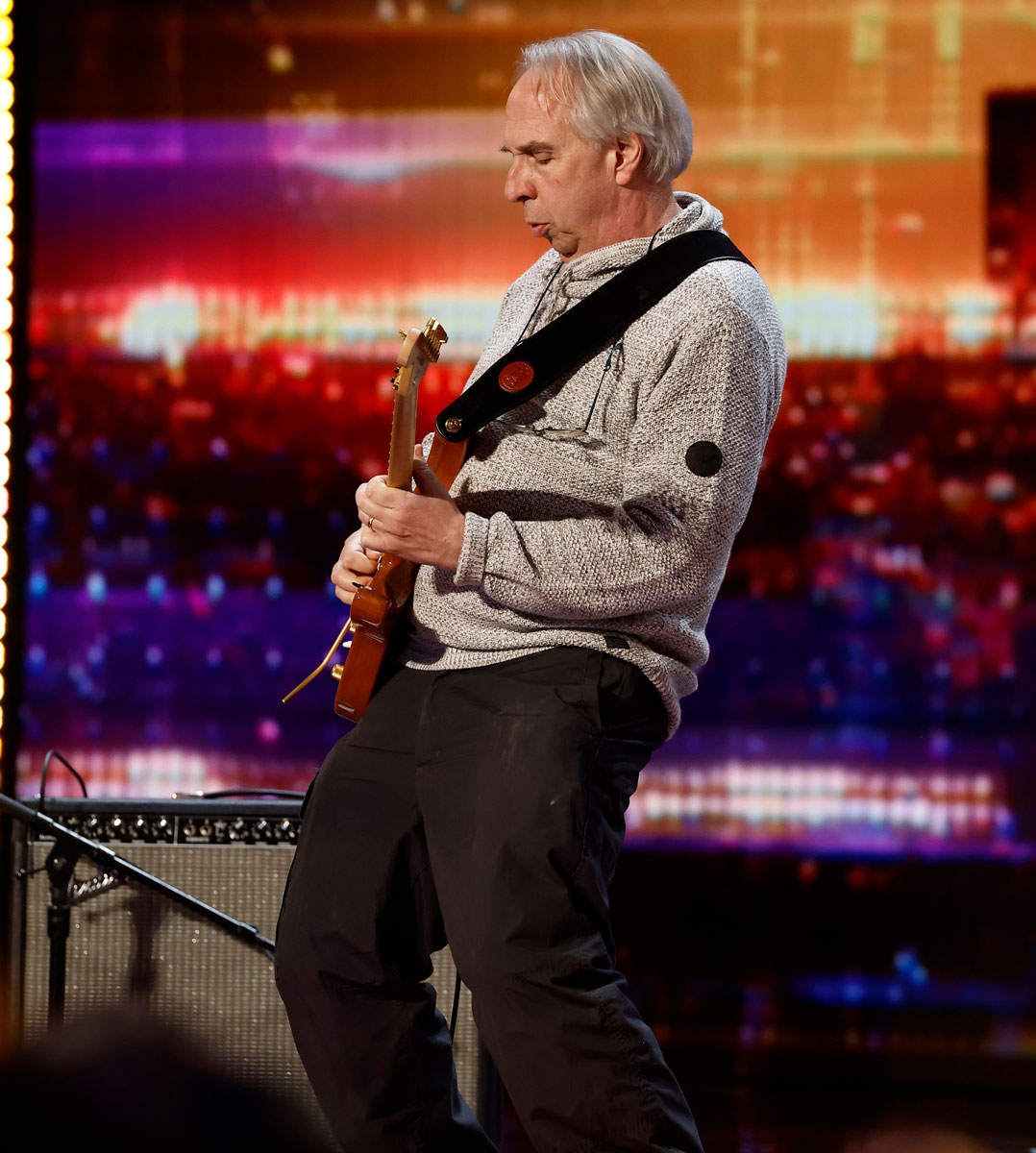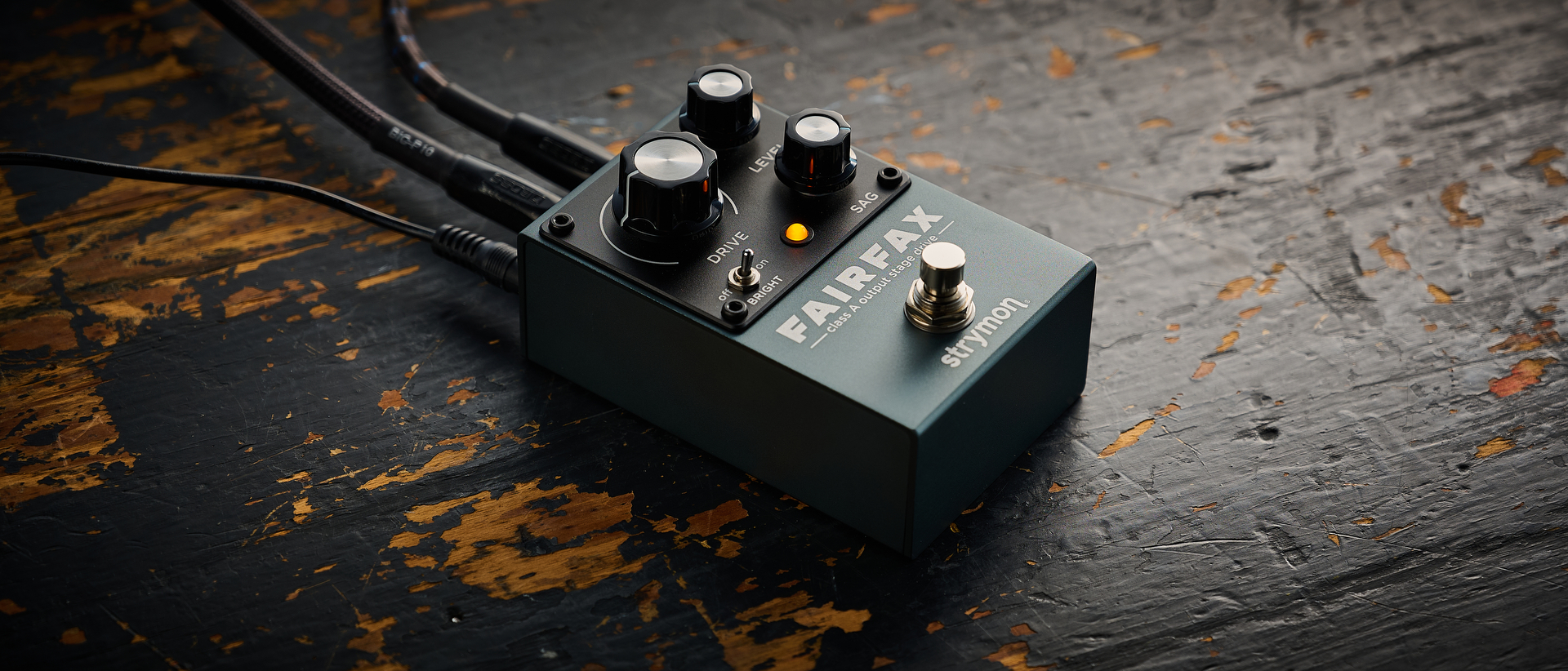This unassuming guitar teacher’s epic America’s Got Talent audition went viral. Here’s how he landed – and nailed – the gig of a lifetime
John Wines, aka Old Grey Guitarist, has over 1m followers on TikTok and blew audiences away with his Brian May and Eddie Van Halen-channeling audition. He tells us how he put together the perfect rock-guitar showcase, and the secret to bossing the electric guitar’s greatest solos on social media

All the latest guitar news, interviews, lessons, reviews, deals and more, direct to your inbox!
You are now subscribed
Your newsletter sign-up was successful
America’s Got Talent is a TV show that’s known for many things, but loud shredding guitars certainly isn’t one of them. That all changed a few weeks back when 59-year-old British guitarist John Wines turned up with a Charvel Pro-Mod DK24 (HH FR M Mahogany with Quilt Maple in a Dark Amber finish, to be more precise) and gave judges Simon Cowell, Heidi Klum, Howie Mandel and Sofía Vergara the thrill of a lifetime.
Wines started his audition with motorbike noises reminiscent of Mick Mars’ work on Mötley Crüe classic Kickstart My Heart before reimagining Freddie Mercury’s immortal vocal melodies from 1977 hit We Will Rock You on his trusty six-string.
When the drums kicked into double time, he then gave the four judges and screaming crowd a masterclass in E minor pentatonic rock guitar, powered by octave bends, two-handed tapping and the kind of two-string arpeggios typified by metal bands like Iron Maiden and Metallica in the ’80s.
“I was not expecting that,” said Simon Cowell, after the guitarist received a standing ovation from all four judges and an excited crowd, who ended up chanting “We want more!” at the top of their collective lungs. Naturally, emotions ran high for the guitarist, turning away to wipe the tears from his eyes before telling the room his experience brought on a mixture of feelings, combining nervous apprehension with intense exhilaration. He will find out whether he's selected to go further in the contest over the coming weeks.
Wines, of course, is no stranger to putting himself out there – he posts regularly on TikTok, Instagram and YouTube under the handle Old Grey Guitarist and has seen his covers of classic tracks by Metallica, Nirvana and Queen go viral, racking up millions of views around the world.
But this, by his own admission, was the most daunting experience of his career to date. So how exactly did a 59-year-old former electrician and music teacher from the English South Coast end up on one of the most popular talent shows on the other side of the Atlantic?
“It all started last year, around October or November,” he tells Guitar World, talking to us from his music room at home, with framed posters of Thin Lizzy and Led Zeppelin proudly on display behind him. “There was a girl at The Bourne Academy, where I teach, who was incredibly nervous about an upcoming performance. They do concerts throughout the term…
All the latest guitar news, interviews, lessons, reviews, deals and more, direct to your inbox!
“I tried to put her at ease, saying, ‘Don’t worry, if you weren’t nervous, I’d be nervous!’ And she said, ‘It’s all right for you, sir… you don’t get nervous anymore!’ And I thought that was kind of true but also maybe not. It played on my mind a little bit.”
This story could have easily ended there were it not for an online advert encouraging creatives to put themselves forward and take part in the next series of AGT. The thought of performing in front of celebrity judges on national television made the guitarist feel a little bit jumpy, to say the least. But why not put his money where his mouth is and in the process show his students how beneficial it can be for musicians to confront their fears?
I knew I had two minutes and spent time mapping out different sections, starting with the main melody for people to recognize but also throwing in stuff like tapping and other techniques
“I never thought anything would come of it, but at least I could say I tried,” he continues. “Then I totally forgot about it until months later in January 2023. I was waiting for an email from someone else and couldn’t understand why it hadn’t come through. Then I realized it may have gone into my spam folder, which I never check. And it still wasn’t there, but something from AGT was…
“I thought, ‘You’ve got to be kidding me!’ Luckily their message had only been there for two days. At first I wondered if it was real, because there’s a lot of that kind of stuff which ends up in your spam. But it did look real and I got back to them, which started a whole series of events that led to me going over.”
What made you choose We Will Rock You for your audition, and how did you go about piecing together the different sections?
“There’s a lot you can’t do. You have to use songs with clearance, because not everyone wants their songs used in different ways, which is fair enough. We bounced ideas back and forth and decided on We Will Rock You. I was going to do some shredding and then go into the end part, which is the real solo played by Brian May.
“They came back to me with a live version which I hadn’t even heard of and suggested not playing Brian’s solo and doing my own thing so people could hear my own style as a musician. It was totally up to me what to play. I spent some time working it all out. I knew I had two minutes and spent time mapping out different sections, starting with the main melody for people to recognize but also throwing in stuff like tapping and other techniques.
“I wanted to get a little bit of everything in there and two minutes is not a lot of time. That’s how I approached it. I wanted to start with the motorbike thing à la Mick Mars and then go into the melody, breaking it all up and putting it back together in ways that felt fun.”

What made you choose the Charvel, out of curiosity? It seems as if you’ve used an original Desert Sun Yellow Ibanez JEM a lot more in your online content…
“I ain’t flying with that one [laughs]! Not a chance. That guitar has been with me since 1989 and if anything happened to it, I’d be mortified. So I’ve had it for 34 years now. It’s worn into me and become totally and utterly irreplaceable.
“When I first got it, I didn’t like the bridge pickup so I had it rewound. I prefer a lot of mid to cut through the mix, so it’s completely unique. They’re worth a fortune now, but the monetary value is secondary. I’d never get rid of that guitar, even if it does my head in at times!
“The only other guitar I’ve got with a Floyd is the Charvel, so I flew with that… and the airline still lost it! Luckily we knew it was in LAX, but it’s rather a large place and nobody could find it. An hour later, they realized it hadn’t been put in the right lift [laughs]!”
Interestingly, you were plugged into what looks like a Fender Twin. Most guitarists would probably have asked for a higher gain, Marshall-style amp for this kind of performance…
I was lucky… I was actually praying for a Fender valve amp!
“I was lucky… I was actually praying for a Fender valve amp! It’s really weird, but I have always played Marshalls and Mesa/Boogies, using the gain channels for drive. Then Blackstar brought out their [Dept. 10] Dual Drive around the same time I’d acquired a Fender Super-Sonic. I thought I’d experiment and see how it sounded…
“Now I don’t use distortion channels at all. I love that Blackstar pedal. It has that valve sound but it’s so much more versatile than an amp. I also use their Dept. 10 Boost, which can be a bit like a Tube Screamer in terms of pushing everything harder. They’re a great company…
“Last year, I wrote to a few companies asking if they would work with the schools I teach at, because it was very important to me. Blackstar sent a load of Fly 3s for the students, as well as a Debut 50 which I will be giving to one of the girls as a prize for winning the Outstanding Musician of the Year award. She’s going to be well made-up when she finds out! D’Addario have been brilliant, too.”

Simon Cowell isn’t exactly known for championing rock music, so his positive reaction must have been a welcome surprise…
“I know… that’s what was worrying me! I was absolutely bricking it. I’ve never felt nerves like that. There was so much riding on it and you only get one shot. Everyone at AGT was so friendly and supportive, they couldn’t do enough for you. I can’t knock them at all.
“It was definitely emotional, especially with the crowd there. The only abiding memory I have from that whole performance is the audience at the end shouting, ‘We want more!’ It just shocked me and hit me like a ton of bricks. I wasn’t expecting that at all.”
You’ve had a lot of success with your Old Grey Guitarist channels, especially on videos like your cover of Crazy Train by Ozzy Osbourne. What was the hardest song to learn and record?
“That one took a few takes [laughs]! It was probably the most challenging. Comfortably Numb was another one. It’s a song I know well but the solo is two minutes long – there’s a lot to remember. When you get to my age, you have a hard time remembering what you had for breakfast that morning… which is really worrying, because I have the same thing for breakfast every morning [laughs]!
“I get asked to do hard stuff all the time, songs like Cliffs of Dover by Eric Johnson. I just can’t do that, it’s far too technical… I know it’s beyond me. Maybe 25 years ago, I would have sat down and worked on bits of it but now I just don’t have the time.
“Usually I’ll play something a few times and if it’s 95 percent there, I’ll hit record. And that’s when I start getting the first note wrong. Why does that happen as soon as you hit record? If people could see my outtakes, they wouldn’t like the language [laughs]!”
So who would you say are your biggest influences on guitar?
I feel like Jeff Healy and Gary Moore pushed the boundaries of blues with higher-gain stuff
“Gary Moore was always my favorite. I saw him many, many times. He just spoke to me the most. Maybe he was renowned to be a bit of a challenging guy, but that was him, you know? I miss that man every day, to be honest. When he went over to blues with his Still Got the Blues album. I remember I’d just gotten into Jeff Healy at the time, who I came across by accident. Both of them were amazing players and sadly no longer with us.
“But it was how Gary reinvented himself as a blues rock musician that I found incredible. I’ve always loved Stevie Ray Vaughan, too, but I feel like Healy and Moore pushed the boundaries of blues with higher-gain stuff. Harder rock steeped in the blues, which is a bit like Hendrix, to be honest.”
What other pedals are you running along with the Blackstar Dept. 10 Boost?
“I didn’t really get into pedals until the lockdown. Before then, I’d go out with a wah, a Phil Hilborne Fat Treble Booster – which I love – and a compressor, that would be it. Back then, my Mesa/Boogie would have all the channels I needed. I much prefer my setup now though, running the Blackstar pedal into the Fender. I don’t see me going away from that, to be honest.”
You use a mix of different guitar brands in your videos, though it seems as if your PRS Custom 22 Artist Pack would be one of your most collectable instruments…
“Yeah, it’s from 2003 and has one of the best PRS tops I’ve ever seen. It was my 40th birthday present to myself. I also had a Custom 24 in Whale Blue before it. The price of them now is a bit crazy.
“The only thing I don’t like is how they can be slightly body-heavy. If you’re sat down playing, they can feel a bit unbalanced. PRS are brilliant guitars though, they’re very well-made. With other brands you have to try each guitar out first, with PRS the consistency is very strong.
“I will use my PRS whenever I need that Les Paul kind of sound, say if I’m doing something on Slash or a player like that. I guess that’s what Paul Reed Smith set out to achieve: the playability of a Fender with the sound of a Gibson. Like my Ibanez, that’s a guitar I would never let go of.”
You’ve worked with a lot of students over the years. Of course, every player will have different needs, but what kind of advice has been most beneficial across the board?
“Vibrato is a big one. A lot of players use finger vibrato, which I might occasionally do, too. But I prefer using wrist vibrato, just because of the sound of it. So that’s become something I nag people about. It’s the same with my bends, I usually have my thumb over the top and use the power from my wrist. There’s more control that way.
“A lot of beginners start off bending from their fingers and when they do that, I tell them all they’ve got is the tendons and muscles there. But when you lock it all down with the wrist and bend from there, you have so much power available to you. It’s a way of getting more from the instrument.
“But there’s no rule as such, I’ve got friends who bend using just the fingers and some of them are better than me! I’ve studied players like Slash, Gary Moore and Stevie Ray… they all bend from the wrist. Joe Bonamassa once said something many years ago which was, ‘If you want to get everything out of a note, you need to create resistance with your picking hand and fight against it with your fretting hand!’ Now, that does sound ridiculous – why would you create resistance against the notes you are trying to play? – but it does work.”
Well, JoBo certainly knows a thing or two about tone!
“Yeah! You definitely get more tone that way. Another thing I nag my students to do is use their ear. Most of them jump on tab sites but I keep telling them to work things out themselves. The notes are right there on the fretboard, so go find them. I always say, ‘What if the tab site’s wrong?!’ and if they say, ‘I’ll go to a different tab site’ I’ll say, ‘Yeah, whatever!’ Notation can’t give you every nuance of a player.
“Gary Moore always used to say nobody could transcribe his solos and he was right. I’ve seen so many people play Still Got the Blues slightly wrong. Technically, it’s absolutely right, but it will lack the feel – whether it’s bending from the right place or too in time. Gary always played slightly behind. That’s what gave him that sound. Music can be a bit fickle.”
It’s funny how different things work for different players and different styles… it’s all about context.
There are two rules in music: the first is there are no rules and the second being if it sounds good, just go for it!
“There are two rules in music: the first is there are no rules and the second being if it sounds good, just go for it! There was a time when students were told they must learn to sight-read. Nowadays, most people will say don’t bother unless you want to become a certain kind of session musician. It’s much better to use your ear.
“The most important thing is to just enjoy it. Guitar is a great hobby. It’s gotten me through a few tough times… but then again, it’s probably caused me a few tough times, too! I always tell my students to never ever turn anything down. I don’t care if they don’t like that song, they should just go and do it.
“There was one student I had who really listened to that. I taught him from the age of 11 to 18, but by the time he was 15 he was pissing all over me because he was happy to learn and play everything. He ended up being invited up on stage with legends like Joe Bonamassa and Bernie Marsden. Which goes to prove, if you keep an open mind, you can do anything.”
Amit has been writing for titles like Total Guitar, MusicRadar and Guitar World for over a decade and counts Richie Kotzen, Guthrie Govan and Jeff Beck among his primary influences as a guitar player. He's worked for magazines like Kerrang!, Metal Hammer, Classic Rock, Prog, Record Collector, Planet Rock, Rhythm and Bass Player, as well as newspapers like Metro and The Independent, interviewing everyone from Ozzy Osbourne and Lemmy to Slash and Jimmy Page, and once even traded solos with a member of Slayer on a track released internationally. As a session guitarist, he's played alongside members of Judas Priest and Uriah Heep in London ensemble Metalworks, as well as handled lead guitars for legends like Glen Matlock (Sex Pistols, The Faces) and Stu Hamm (Steve Vai, Joe Satriani, G3).

